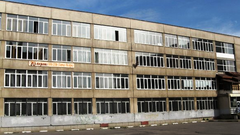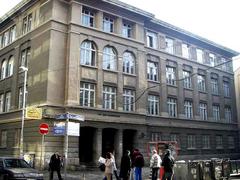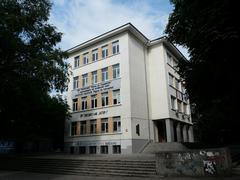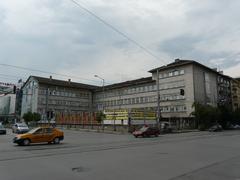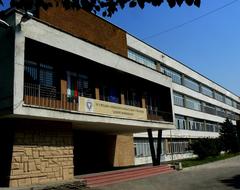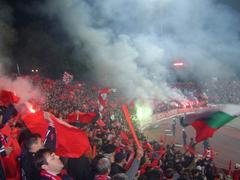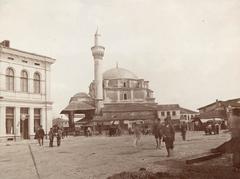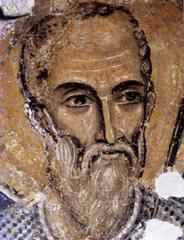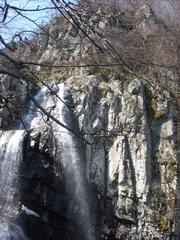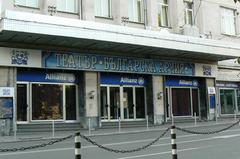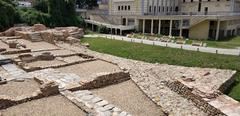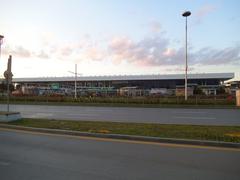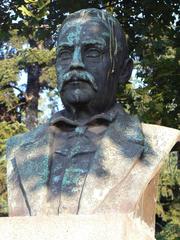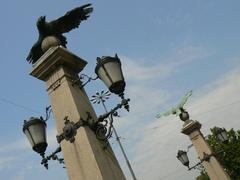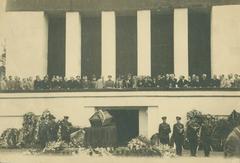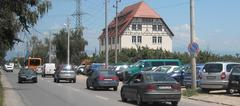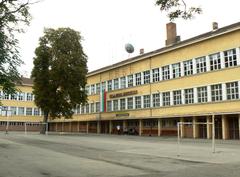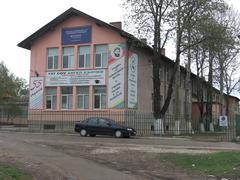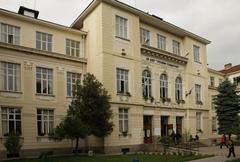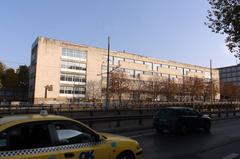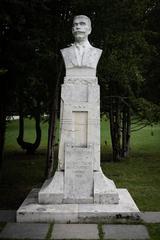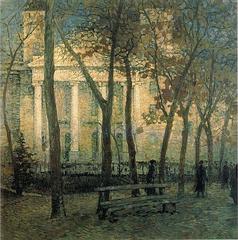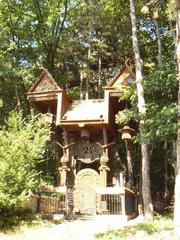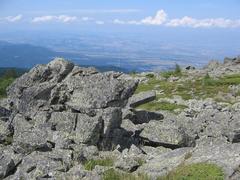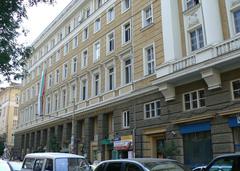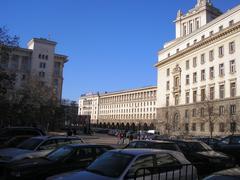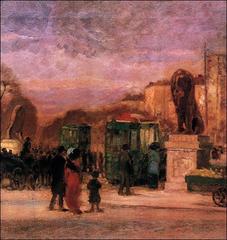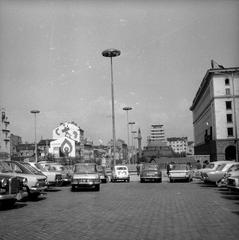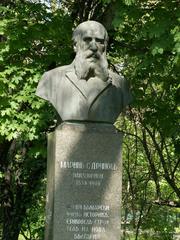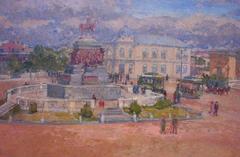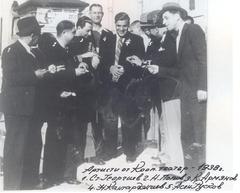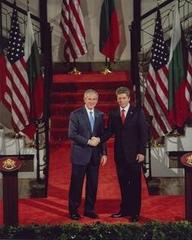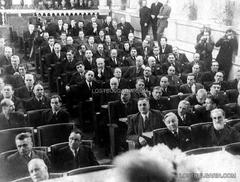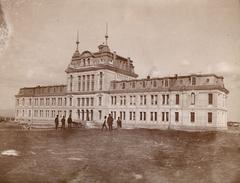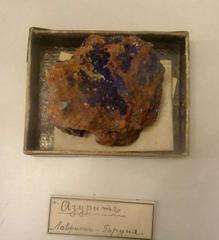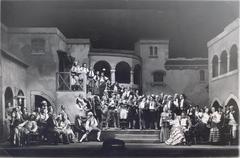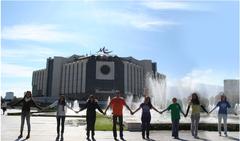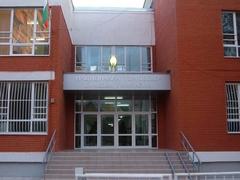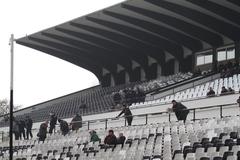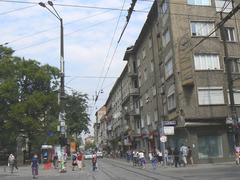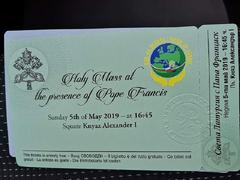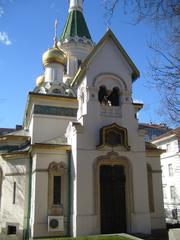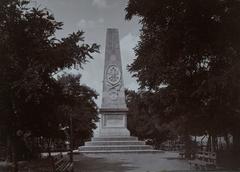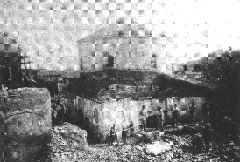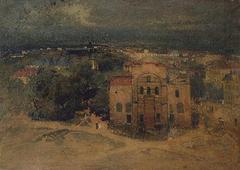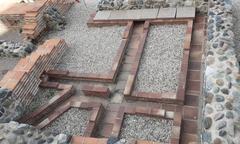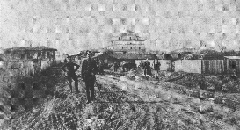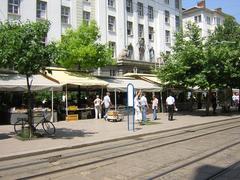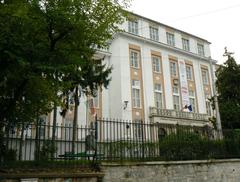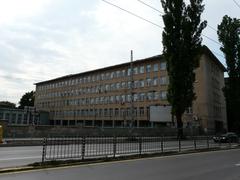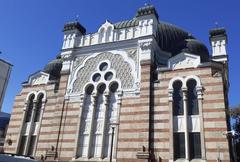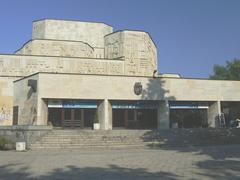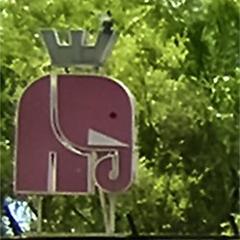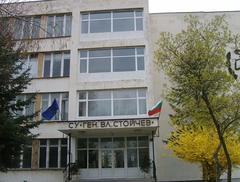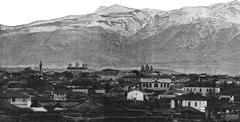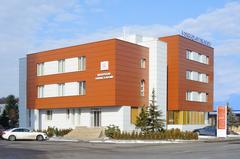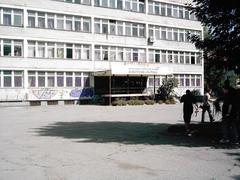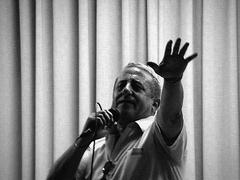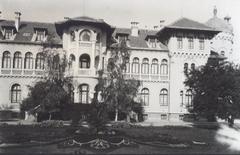Visiting 40 School “Louis Pasteur” in Sofia, Bulgaria: Complete Guide with Hours, Tickets, and Tips
Date: 14/06/2025
Introduction
Nestled in Sofia’s Lyulin district, 40 School “Louis Pasteur” is a distinguished educational institution that serves as a hub for scientific learning, community events, and cultural exchange. Named after the pioneering French scientist Louis Pasteur, the school exemplifies Bulgaria’s commitment to modern education, critical thinking, and public health awareness. This comprehensive guide offers visitors, educators, and cultural enthusiasts essential information on the school’s history, significance, visitor protocols, practical details, and tips for making the most of a visit.
Historical Background and Significance
Origins and Context
Established during Bulgaria’s mid-20th-century educational reforms, 40 School “Louis Pasteur” reflects a national drive to enhance scientific education and foster a spirit of inquiry among youth. The institution’s name pays tribute to Louis Pasteur, whose revolutionary work in microbiology, vaccination, and public health transformed medical science worldwide (Louis Pasteur biography; Pasteur Institute legacy). The school’s founding aligns with a broader movement in Bulgaria to modernize curricula, promote health, and elevate scientific literacy (Bulgaria Focus).
Educational Mission
40 School “Louis Pasteur” offers a science-oriented curriculum for students aged approximately 7 to 18. Its programs are designed to encourage experimentation, observation, and analytical thinking—hallmarks of Pasteur’s own methodology. The school also functions as a community center, hosting science fairs, public lectures, and events that promote education and health awareness (Cybo).
The Legacy of Louis Pasteur at the School
Louis Pasteur’s contributions to science, including vaccine development and pasteurization, are central to the school’s ethos. The curriculum and extracurricular activities champion scientific inquiry, hygiene, and public service—values drawn directly from Pasteur’s life. Annual events, such as commemorations of Pasteur’s birthday and participation in city-wide science festivals, embed his legacy within the school’s culture (Pasteur Institute; Bulgaria Focus).
Architectural and Cultural Features
The school’s late-20th-century architecture is functional and community-focused, with modern classrooms, well-equipped laboratories, and recreational spaces. Culturally, 40 School “Louis Pasteur” is active in Sofia’s educational celebrations, such as the “Day of the Bulgarian Enlighteners,” and regularly hosts exhibitions and collaborative events with other institutions (Bulgaria Focus).
Practical Visitor Information
Location and Accessibility
- Address: Lyulin 10, ul. “Dobrinova Skala” 1, 1335 Sofia, Bulgaria
- Neighborhood: Lyulin district, 8–10 km west of Sofia’s city center. The area is safe, vibrant, and well-connected (Not a Nomad Blog).
- Public Transport: Reachable via Sofia Metro Line 1 (Lyulin Station, ~800m from the school), and buses 82, 108, and 310. Taxis and limited parking are available (Sofia Metro Official Site; Sofia Urban Mobility Center).
Visiting Hours and Admission
- Public Access: The school does not maintain regular public visiting hours or ticketed entry.
- Arranging Visits: All visits must be arranged in advance by contacting the school administration. Open days, science fairs, and cultural events are the best opportunities for public access.
- Admission Fees: No fees or tickets are required; advance registration may be necessary for events.
Accessibility
- Mobility: The school features ramps and accessible restrooms, though some older areas may have limited accessibility. Pre-arrange visits if you have specific requirements.
Facilities and Amenities
- Restrooms: Basic visitor restrooms are available.
- Wi-Fi: Not generally available; use mobile data or nearby cafes.
- Cafeteria: Open during public events, serving Bulgarian meals.
- Luggage Storage: Not provided; use city lockers at Sofia Central Station or GIFTED shop.
Visitor Experience and Events
What to Expect
The school offers a lively educational environment, with modern classrooms, science labs, sports facilities, and green spaces. Visitors often remark on the strong sense of community and the school’s engagement with local families.
Special Events
- Open Days: Guided tours, staff meet-and-greets, and curriculum showcases.
- Science Fairs: Student projects inspired by Pasteur’s work.
- Cultural Celebrations: Participation in city-wide festivals such as Sofia Science Festival and European Researchers’ Night.
Note: Registration is required for all special events due to security protocols.
Language and Communication
Bulgarian is the primary language, but English is spoken by many staff involved in international programs. Most signage is in Bulgarian, but event information is often available in English.
Security and Protocols
- Check-in: Visitors must sign in at reception and present ID.
- Accompaniment: All guests are accompanied by staff.
- Photography: Restricted; obtain explicit permission before taking photos.
- Dress Code: Modest and professional attire is recommended.
Nearby Attractions and Services
- Cultural Sites: National History Museum, Alexander Nevsky Cathedral, Sofia History Museum (Sofia Guide; Balkans Countries Info).
- Local Amenities: Cafés, restaurants, shops, pharmacies, and nearby accommodations.
- Public Transport: Use the Sofia Urban Mobility Center for route planning.
Frequently Asked Questions (FAQ)
Q: Can I visit 40 School “Louis Pasteur” without prior arrangement?
A: No. Visits must be scheduled in advance or coincide with public events.
Q: Are there entrance fees or tickets?
A: No; entry is free, but some events may require prior registration.
Q: Is the school accessible for visitors with disabilities?
A: Accessibility is improving; contact the administration for details on facilities.
Q: What is the best way to reach the school?
A: Sofia Metro Line 1 is the most efficient option, followed by buses or taxis.
Q: Are guided tours available?
A: Occasionally, during open days or special events. Advance booking and translation arrangements are recommended.
Tips for a Meaningful Visit
- Plan Ahead: Contact the school to confirm dates and procedures.
- Use Public Transport: Avoid parking challenges.
- Engage Respectfully: Follow school policies, especially regarding privacy and photography.
- Combine Visits: Explore nearby cultural sites for a richer experience.
- Language: Bringing a Bulgarian-speaking companion or arranging for translation can enhance your visit.
Final Recommendations and Summary
40 School “Louis Pasteur” is a testament to Bulgaria’s educational values and scientific heritage, honoring the legacy of Louis Pasteur through its curriculum, community engagement, and international partnerships. While not a typical tourist attraction, it offers unique insights into Bulgaria’s approach to science education and public health. For the best experience, plan your visit in advance, respect security protocols, and immerse yourself in both the school’s vibrant community and Sofia’s cultural landscape.
For updated visitor information and Sofia travel insights, consider using the Audiala app and following related resources.
Sources and Further Reading
- Visiting 40 School “Louis Pasteur” in Sofia: History, Educational Significance, and Visitor Information – Bulgaria Focus
- Significance of 40 School “Louis Pasteur” – Education State University
- Location, Accessibility, and Visitor Experience at 40 School Louis Pasteur, Sofia – Not a Nomad Blog
- Practical Visitor Tips for 40 School “Louis Pasteur” in Sofia, Bulgaria – Sofia Urban Mobility Center
- Louis Pasteur Biography and Legacy – Notable Biographies
- Pasteur Institute Reports on Louis Pasteur – Pasteur Institute
- Sofia Historical Sites Guide – Sofia Guide
- 40 School Louis Pasteur Listing – Cybo Business Directory
- Sofia Metro Official Site
- Nomadic Matt Bulgaria Travel Guide – Nomadic Matt
- Destination Abroad Sofia Travel Review – Destination Abroad
